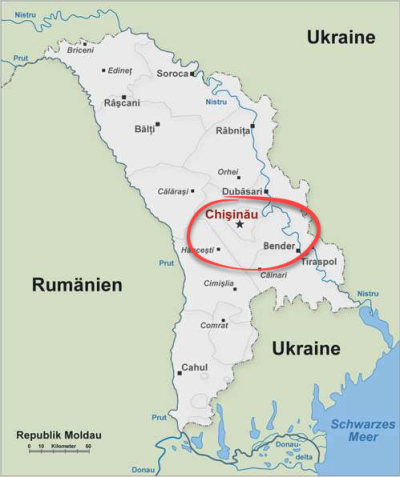_English_
User Tools
Site Tools
Sidebar
4.5 Accommodation of Krasna immigrants in Moldovan villages 1814-1816
What a disappointment! Our emigrants could not immediately go to their new colony. The promised home did not yet exist. At that time, the Russian government had by no means completed its preparations for housing the colonists.
- There was a shortage of housing. The Russian authorities had failed to make the promised preparations in time.
- The steppe areas intended for settlement were for the most part still leased. Only after the expiration of the leases could these pieces of land be allocated to the settlers.
The new beginning in Bessarabia was certainly not imagined to be as difficult as it turned out to be. Only a few arrived already in 1814 in their later colony. Most of them had to take shelter with Moldavian peasants for one or two years.
They were quartered for the time being in various Moldovan villages near the towns of Kishinev and Bender. Excerpt from the Krasna Municipal Report 1848: “…and when they had crossed the Russian border at Uchiluk, they were given quarters in Moldovan villages. Many also had quarters in Kishinev. A large part lay in Bender from September 1814 to June 1815, and some until the spring of 1816.”

Source:https://upload.wikimedia.org/wikipedia/commons/d/dd/Karte_Moldawien_03_03.png
Krasna colonists were quartered for several months in various Moldovan villages near the towns of Kishinev and Bender.
Some of the places where Krasna people were quartered are evident from the Krasna baptismal register. The quartering so far from the later settlement place (from Kishinev to Krasna it is a good 100 km) is due to the fact that there were no suitable places near Krasna. In the whole southern part of the country at that time only Bender, Akkerman, Ismail and a few smaller localities existed as closed settlements.
Living together with the natives certainly brought many an inconvenience; moreover, illness and death entered many a house. So close to the goal, and now months of waiting until one could get one's own piece of land and build one's hut on it. A test of patience!
The Moldavian people were foreign to the Germans; their language was incomprehensible to them. The customs were completely different, the dwellings were primitive. The Germans learned to eat 'mamaliga', which was also eaten later on in Krasna.
The quartering lasted for different lengths of time; a few weeks, several months, a year or even longer. Eduard Ruscheinsky writes: “A part moved to the place of their settlement in the autumn of 1814… The rest left their Moldavian quarters only in the spring of 1815.” And according to the Krasna Municipal Report 1848, the remaining 43 families arrived even in the spring of 1816.

